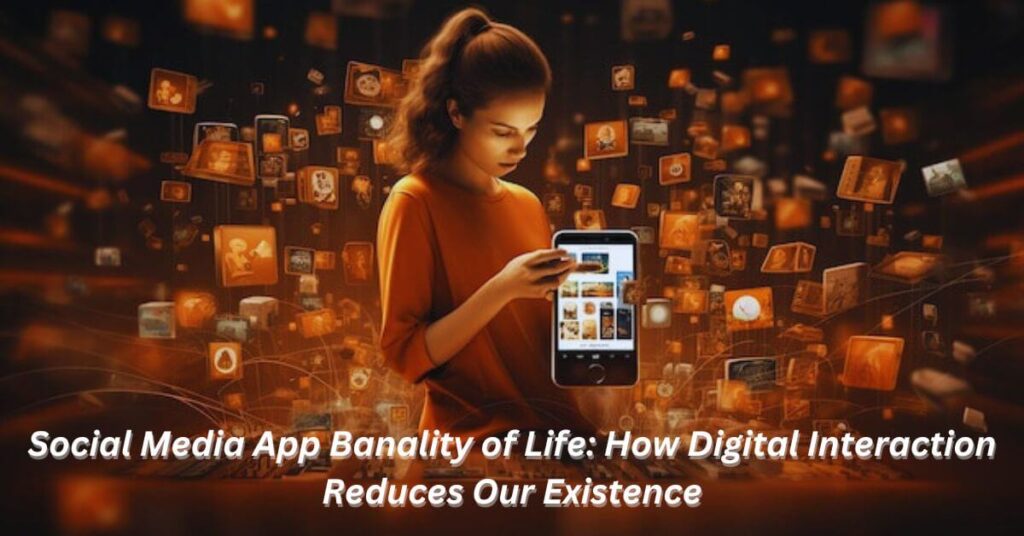Social Media App Banality of Life, in a world increasingly dominated by digital interactions, social media has become an inseparable part of our daily lives. From waking up in the morning to the lull of bedtime, the rhythm of modern existence is punctuated by the relentless scroll through feeds, the constant ping of notifications, and the fleeting gratification of likes and shares. While social media offers a platform for connection, creativity, and information, it also gives rise to an ironic paradox: the more we engage with it, the more we find ourselves trapped in the banality of life. This article explores the intricate dynamics of social media apps and their role in amplifying the mundane aspects of our existence, often disguising it as meaningful engagement.
The Ubiquity of Social Media App Banality of Life
Social media apps have woven themselves into the fabric of contemporary life. From Facebook and Instagram to Twitter and TikTok, these platforms serve as virtual arenas where people broadcast their lives, share opinions, and consume content. The ubiquitous nature of social media means that it touches nearly every aspect of our lives—work, relationships, entertainment, and even our sense of identity.
The Appeal of Connectivity
One of the primary reasons for the widespread adoption of social media is its promise of connectivity. People are naturally inclined to share their experiences, stay in touch with friends and family, and find communities of like-minded individuals. Social media apps cater to this need by offering a space where connections can be forged and maintained, regardless of geographical distances.
However, this connectivity often comes with a catch. The ease with which we can share our lives with others can lead to a superficial engagement with the world around us. Instead of meaningful interactions, we often find ourselves engaging in what can only be described as digital small talk—liking a post, leaving a comment, or sharing a meme—actions that are fleeting and, more often than not, devoid of genuine connection.
The Allure of Instant Gratification
Social media apps are designed to keep users hooked, leveraging the psychology of instant gratification. The dopamine rush triggered by a new like, comment, or follower creates a feedback loop that keeps us coming back for more. This cycle of reward and anticipation is what makes social media so addictive.
But beneath the surface, this addiction to instant gratification contributes to the banality of life. The more we seek validation through social media, the more our sense of self-worth becomes tied to the approval of others. Over time, this can lead to a shallow existence, where the pursuit of likes and followers takes precedence over real-life experiences and personal growth.
The Banality of Everyday Life on Social Media
Social media has transformed the way we document and share our lives. In the past, people would capture significant moments—birthdays, weddings, vacations—in photo albums or journals. Today, every aspect of life, no matter how mundane, is deemed worthy of sharing online.
The Curation of the Ordinary
One of the most striking features of social media is the way it encourages the curation of ordinary life. People share photos of their meals, their morning routines, their pets, and even their grocery shopping trips. While these posts may seem trivial, they are part of a larger trend where the ordinary is elevated to the level of spectacle.
This curation of the mundane serves to reinforce the banality of life. Instead of seeking out new experiences or engaging in activities that bring genuine fulfillment, people often find themselves caught in a loop of documenting and sharing the ordinary. The result is a life that is lived not for the sake of personal satisfaction, but for the approval and validation of an online audience.
The Illusion of Significance
Social media also creates the illusion that every moment of our lives is significant and worth sharing. The platforms encourage us to post updates, photos, and videos of our daily activities, no matter how trivial they may be. This constant sharing can lead to a sense of pressure to make our lives appear more interesting or exciting than they actually are.
The need to present a curated version of our lives can be exhausting and ultimately unfulfilling. The more we try to create an image of a life that is worth sharing, the more we distance ourselves from the reality of our existence. This disconnect between our online personas and our real lives can contribute to a sense of dissatisfaction and a feeling that our lives are, in fact, quite banal.
The Impact on Mental Health
The rise of social media has been accompanied by growing concerns about its impact on mental health. While social media can provide a sense of connection and community, it can also lead to feelings of loneliness, anxiety, and depression.
The Comparison Trap
One of the most detrimental aspects of social media is the tendency to compare ourselves to others. When we scroll through our feeds, we are often bombarded with images of people who appear to be living perfect lives—traveling to exotic locations, attending glamorous events, achieving professional success, and enjoying fulfilling relationships.
This constant exposure to the highlight reels of others’ lives can lead to feelings of inadequacy and self-doubt. The more we compare ourselves to the carefully curated images we see on social media, the more we may come to believe that our own lives are lacking in comparison. This can contribute to a sense of disillusionment and a feeling that our own existence is, by contrast, dull and unremarkable.
The Echo Chamber Effect
Social media apps are designed to keep us engaged by showing us content that aligns with our interests and beliefs. This can lead to the creation of echo chambers, where we are only exposed to information and opinions that reinforce our existing views.
While echo chambers can create a sense of comfort and validation, they can also contribute to the banality of life by limiting our exposure to new ideas and perspectives. Instead of engaging in meaningful discussions or challenging our beliefs, we may find ourselves stuck in a loop of consuming content that only serves to reinforce our existing worldview. This can lead to a sense of stagnation and a lack of personal growth.
The Role of Social Media in Shaping Reality
Social media has a powerful influence on the way we perceive and interact with the world. The content we consume on these platforms can shape our opinions, our beliefs, and even our sense of reality.
The Blurring of Reality and Fiction
One of the most concerning aspects of social media is the way it blurs the line between reality and fiction. The carefully curated images and stories we see on these platforms often present a distorted view of reality, where only the most glamorous, exciting, or dramatic aspects of life are highlighted.
This blurring of reality can lead to a distorted perception of our own lives. When we compare our everyday experiences to the idealized versions of life we see on social media, we may begin to feel that our own lives are lacking in some way. This can contribute to a sense of dissatisfaction and a feeling that our existence is, by comparison, mundane and uninteresting.
The Spread of Misinformation
Social media also plays a significant role in the spread of misinformation. The algorithms that power these platforms are designed to prioritize content that is likely to generate engagement, which often means that sensational or misleading information is given more visibility than accurate, well-researched content.
The spread of misinformation can have serious consequences, both on an individual and societal level. On a personal level, it can contribute to a distorted view of reality and reinforce existing biases. On a societal level, it can contribute to the polarization of communities and the erosion of trust in institutions.
Finding Meaning Beyond Social Media
While social media has become an integral part of modern life, it is important to recognize its limitations and the impact it can have on our perception of reality. To avoid falling into the trap of the banality of life, it is essential to find meaning and fulfillment beyond the digital realm.
Cultivating Real-Life Connections
One of the most effective ways to combat the banality of social media is to cultivate real-life connections. While online interactions can provide a sense of connection, they are no substitute for the depth and richness of face-to-face relationships.
Spending time with friends and family, engaging in meaningful conversations, and participating in activities that bring joy and fulfillment can help to create a more balanced and satisfying life. By prioritizing real-life connections over digital ones, we can avoid the superficiality and banality that often accompany social media use.
Pursuing Personal Growth and Fulfillment
Another way to avoid the banality of life on social media is to focus on personal growth and fulfillment. This can involve pursuing hobbies and interests that bring joy and satisfaction, setting goals and working towards them, and seeking out new experiences and challenges.
By focusing on our own personal development, we can create a life that is rich in meaning and purpose. This, in turn, can help to counteract the sense of banality that often accompanies excessive social media use.
Conclusion
Social media apps have undeniably transformed the way we live, connect, and perceive the world. While they offer numerous benefits, including the ability to stay connected with loved ones and access information, they also have a darker side. The constant need for validation, the curation of ordinary life, and the blurring of reality can all contribute to a sense of banality and dissatisfaction.
To avoid falling into the trap of the banality of life, it is important to recognize the limitations of social media and to seek out meaning and fulfillment beyond the digital realm. By cultivating real-life connections, pursuing personal growth, and maintaining a balanced perspective, we can create a life that is rich in meaning, purpose, and genuine connection.
Social media may be a powerful tool, but it is ultimately up to us to determine how we use it and how much of our lives we allow it to shape. By being mindful of its impact, we can navigate the digital landscape with intention and create a life that is anything but banal.







